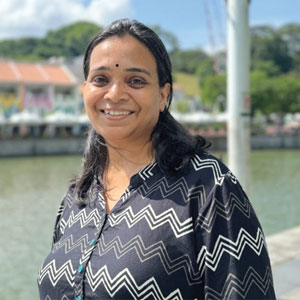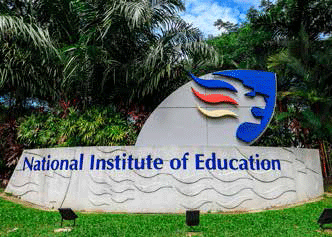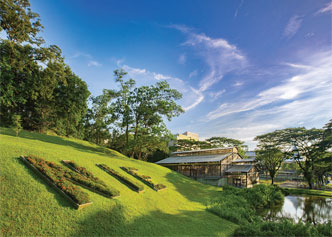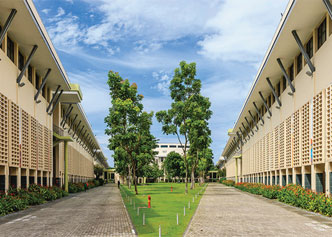How NIE's Science Of Learning Programme Inspires India's Educator To Shape Future Generations
 The pursuit of knowledge has long been a cornerstone of India’s culture, and as global education landscapes evolve, Indian educators are increasingly looking to expand their expertise beyond borders. This search for internationally accredited programmes is demonstrated in the journey of an Indian education professional who recently completed a Master of Science (Science of Learning) at the National Institute of Education, Nanyang Technological University, Singapore (NIE NTU, Singapore).
The pursuit of knowledge has long been a cornerstone of India’s culture, and as global education landscapes evolve, Indian educators are increasingly looking to expand their expertise beyond borders. This search for internationally accredited programmes is demonstrated in the journey of an Indian education professional who recently completed a Master of Science (Science of Learning) at the National Institute of Education, Nanyang Technological University, Singapore (NIE NTU, Singapore).
With nearly two decades of experience, including significant contributions as a teacher and academic consultant, Ms Shobhana Mani embarked on this programme to deepen her understanding of how students learn, how educators teach, and how curricula can bridge these two essential aspects of education. Her story is an example of the opportunities that international programmes offer to advance educational expertise and shape future generations.
The Decision to Study Abroad
For many Indian educators, the decision to pursue studies overseas is influenced by the dual desire to gain advanced skills and insights while also broadening perspectives on education. Education in India has a storied legacy, and modern-day educators carry forward a commitment to innovative teaching. However, with the rapid integration of technology, evolving learning methodologies, and a growing emphasis on mental well-being and personalised education, there is a need for insights into international best practices. These dynamics can sometimes be constrained within local frameworks, leading educators to explore institutions abroad.
Ms Mani’s decision to study at NIE came after years of hands-on experience, initially as a middle and high school teacher of Mathematics, Science, and Physics in India, and later as an administrator at an international school in Singapore. Her role as an academic consultant enabled her to influence and shape curricula across multiple schools. She recognised that to be a true change-maker, she needed a deep, evidence-based understanding of learning science—a foundation that NIE’s Master of Science (Science of Learning) (MSc SoL) programme offered.
Discovering the Science of Learning
The MSc SoL programme at NIE is designed to explore fundamental questions in education: How do we learn? How can teaching be optimised to support diverse learners?
How can we harness new technologies and approaches to facilitate better educational outcomes? These questions aligns closely with educators seeking to apply the latest scientific insights to improve classroom practices.
 Ms Mani, inspired by her work with teachers, sought to understand the mechanics of learning from both the educator’s and student’s perspectives. This interdisciplinary programme, combining elements of neuroscience, educational psychology, and advanced data analytics, provided her with the analytical tools and theoretical grounding necessary to build a more holistic understanding of education. With its renowned faculty and cutting-edge research, NIE offered the ideal environment for her to cultivate these skills, ensuring that her efforts in curriculum development and teacher training would be grounded in the most up-to-date scientific knowledge.
Ms Mani, inspired by her work with teachers, sought to understand the mechanics of learning from both the educator’s and student’s perspectives. This interdisciplinary programme, combining elements of neuroscience, educational psychology, and advanced data analytics, provided her with the analytical tools and theoretical grounding necessary to build a more holistic understanding of education. With its renowned faculty and cutting-edge research, NIE offered the ideal environment for her to cultivate these skills, ensuring that her efforts in curriculum development and teacher training would be grounded in the most up-to-date scientific knowledge.
Reflecting on her time at NIE, Ms Mani describes the experience as “an intellectually stimulating and academically challenging journey.” The programme fostered a nuanced understanding of education that bridges research and practice, empowering her to make informed decisions that benefit students and teachers alike.
 Campus Life at NIE: A Global, Collaborative Experience
Campus Life at NIE: A Global, Collaborative Experience
Studying abroad can be daunting, but the vibrant, collaborative community at NIE helped Ms Mani feel at home. The NIE campus, part of Nanyang Technological University, is known for its commitment to academic excellence and its welcoming atmosphere, which encourages friendships and professional networks. “The NIE and NTU campus pulses with positive intent and activity, creating an inescapable vibrant atmosphere,” she shares. Her experiences extended beyond the classroom, allowing her to engage in cultural exchanges and participate in initiatives like NTU’s “Seas of Silk” Graduate College Community Engagement Programme. Working alongside students from diverse backgrounds and academic disciplines, Ms Mani contributed to NTU’s sustainability efforts, further enriching her perspective on the interconnectedness of education and community.
In her academic journey, Ms Mani found a mentor in Assistant Professor Farhan Ali, the Programme Leader of MSc SoL, whose dedication to the programme’s students left a lasting impact. Describing him as “an excellent educator and mentor,” she noted that Assistant Professor Ali’s unique perspectives challenged her to think deeply and approach educational challenges in fresh ways.
Bringing Knowledge Home
The insights and skills gained through NIE’s MSc SoL programme have already started to influence Ms Mani’s work as an academic consultant in India. Armed with a refined understanding of neuroscience, data analysis, and AI applications in education, she now brings evidence-based approaches to her work, empowering teachers to build curricula that are engaging and scientifically grounded. These learnings are particularly valuable in India, where educators are striving to adapt to new educational standards and practices, such as the National Education Policy (NEP) 2020, which emphasises critical thinking, inclusivity, and the use of technology in the classroom.

For aspiring educators and lifelong learners, NIE’s MSc SoL programme presents a unique opportunity to gain specialised skills that are applicable across international contexts. With education at the heart of India’s social and economic progress, graduates like Ms Mani show how Indian educators can leverage global programmes to effect meaningful change at home. In her own words, Ms Mani describes the programme: “The diverse academic and professional backgrounds of my classmates made our classroom discussions multidimensional, creating a vibrant and stimulating environment for learning and growth.”
Inspiring the Next Generation of Indian Educators
For those in India considering a similar journey, Ms Mani’s journey highlights the significance of studying abroad not only as a means to enhance personal expertise but also as a way to contribute to the broader educational landscape in India. She has gained far more than academic knowledge; she returned with a renewed sense of purpose, the confidence to implement change, and a global network of peers and mentors.
In an increasingly interconnected world, the opportunity to study at a globally recognised institution like NIE can be a pivotal step in the career of an Indian educator. Through immersive coursework, faculty mentorship, and rich collaborative experiences, NIE’s postgraduate programmes open doors to innovation in teaching practices, curriculum development, and a deeper appreciation for and understanding of learning. This is more than just a degree—it is a stepping stone for educators committed to fostering an environment where students are inspired to learn and thrive.
Ranked among the top universities globally, NIE is currently accepting applications for Graduate Programmes by Coursework until 6 January 2025, and Graduate Programmes by Research until 31 January 2025. Scholarships are available.
Apply today https://ntu. sg/nieGradProgIntake and join in the journey to bring education to life!

